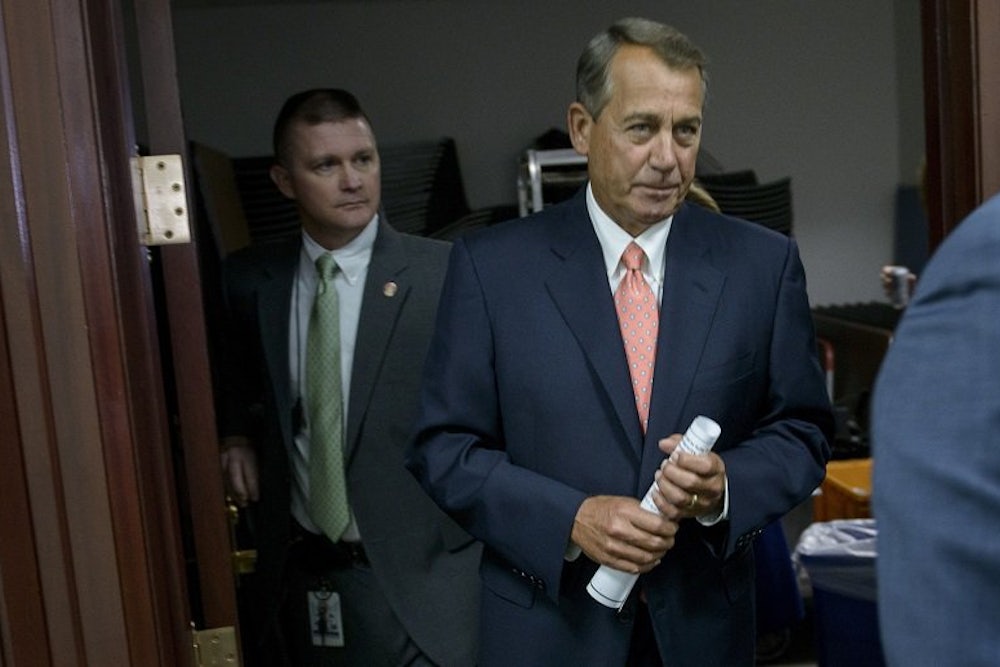On Tuesday, Senate Democrats filibustered a House-passed bill that funds the Department of Homeland Security (DHS) through the remainder of the fiscal year and blocks President Barack Obama’s executive actions on immigration. What comes next isn’t exactly clear. But there are two very good reasons why you shouldn’t be worried about the outcome of this fight.
This battle began in December when conservatives refused to pass a government funding bill that did not address Obama’s recently announced executive action that granted a reprieve from deportation for four million undocumented immigrants. In order to avoid a government shutdown, Republicans settled on a plan to fund most parts of the federal government through the remainder of the fiscal year, with DHS funded through February 27. Conservatives accepted this compromise because they felt they had more leverage in a new Congress with a Republican Senate. They intend to use that leverage, and the threat of a shutdown at DHS, to force Obama’s hand.
Scary, right? Not really. First, we’ve been through this before. House Speaker John Boehner’s playbook for dealing with his conservative members is well known by now. He offers legislation that generally upholds their demands. That legislation inevitably fails, either in the House or Senate. Then Boehner returns to his members and says, “See, that plan doesn’t work. We have to go with a clean funding bill.” He reminds them of the political hit the Republican Party took after the 2013 government shutdown and argues that another, albeit smaller, shutdown fight distracts from the party’s message. The far right is generally not convinced by those arguments but enough moderate Republicans agree that it gives Boehner the necessary support to pass a clean funding bill. Crisis avoided!
Boehner is adopting the same strategy right now. He allowed conservatives a vote on the DHS funding bill that also blocks Obama’s executive action so he can say he tried to extract policy concessions from the president. Now that it failed, he can tell Republicans that they have to find a new strategy to fund DHS; they can’t sit idly by as the funding deadline passes and Obama continues to argue that the GOP is putting the country’s security at risk. I don’t know what the House GOP will decide next. But I’m pretty confident that the end legislation will be a clean bill to fund DHS. In fact, Boehner hinted at this just a few weeks ago. "Our goal here is to fund the Department of Homeland Security,” he said. “And our second goal is to stop the president's executive overreach.” Unless Boehner’s priorities have changed, he’ll eventually bring up a clean bill to fund the government.
But even if Boehner does side with conservatives, a shutdown at the Department of Homeland Security wouldn’t be quite as bad as it sounds. Essential personnel still must work during the shutdown, albeit without paychecks—and DHS has a lot of essential personnel. When the department made a contingency plan for a shutdown in 2013, they specified how many personnel would be classified as essential from each agency. For Customs and Border Patrol, it was 52,673 out of 59,561—nearly 90 percent. Eighty percent of workers in U.S. Immigration and Customs Enforcement were classified as essential. For the Transportation and Security Administration, it was over 93 percent. And for U.S. Citizenship and Immigration Services, more than 97 percent. In other words, while a shutdown at DHS wouldn’t be good, it wouldn’t put U.S. security at risk and very few Americans would notice the difference.
In the upcoming weeks, as the funding deadline approaches, you’ll hear a lot about this fight as Republicans scramble to find a solution. The media will jump on any cracks between Boehner and his conservative members. Those cracks may be real and meaningful, but ultimately, the stakes in this fight are very low.
